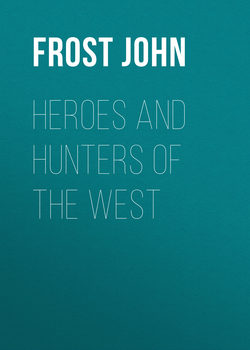Читать книгу Heroes and Hunters of the West - Frost John - Страница 6
Samuel Brady
ОглавлениеCaptain Samuel Brady was the Daniel Boone of Western Pennsylvania. As brave as a lion, as swift as a deer, and as cautious as a panther, he gave the Indians reason to tremble at the mention of his name. As the captain of the rangers he was the favorite of General Brodhead, the commander of the Pennsylvania forces, and regarded by the frontier inhabitants as their eye and arm.
The father and brother of Captain Brady being killed by the Indians, it is said that our hero vowed to revenge their murder, and never be at peace with the Indians of any tribe. Many instances of such dreadful vows, made in moments of bitter anguish, occur in the history of our border, and, when we consider the circumstances, we can scarcely wonder at the number, though, as Christians, we should condemn such bloody resolutions.
Many of Brady’s exploits are upon record; and they are entitled to our admiration for their singular daring and ingenuity. One of the most remarkable is known in border history as Brady’s Leap. The energetic Brodhead, by an expedition into the Indian country, had delivered such destructive blows that the savages were quieted for a time. The general kept spies out, however, for the purpose of guarding against sudden attacks on the settlements. One of the scouting parties, under the command of Captain Brady, had the French creek country assigned as their field of duty. The captain reached the waters of Slippery Rock, without seeing any signs of Indians. Here, however, he came on a trail, in the evening, which he followed till dark, without overtaking the enemy. The next morning the pursuit was renewed, and Brady overtook the Indians while they were at their morning meal. Unfortunately, another party of savages was in his rear, and when he fired upon those in front, he was in turn fired upon from behind. He was now between two fires, and greatly outnumbered. Two of his men fell, his tomahawk was shot from his side, and the enemy shouted for the expected triumph. There was no chance of successful defence in the position of the rangers, and they were compelled to break and flee.
Brady ran towards the creek. The Indians pursued, certain of making him captive, on account of the direction he had taken. To increase their speed, they threw away their guns, and pressed forward with raised tomahawk. Brady saw his only chance of escape, which was to leap the creek, afterwards ascertained to be twenty-two feet wide and twenty deep. Determined never to fall alive into the hands of the Indians, he made a mighty effort, sprang across the abyss of waters and stood rifle in hand upon the opposite bank. As quick as lightning, he proceeded to load his rifle. A large Indian, who had been foremost in pursuit, came to the opposite bank, and after magnanimously doing justice to the captain by exclaiming “Blady make good jump!” made a rapid retreat.
Brady next went to the place appointed as a rendezvous for his party, and finding there three of his men, commenced his homeward march, about half defeated. Three Indians had been killed while at their breakfast. The savages did not return that season, to do any injury to the whites, and early in the fall, moved off to join the British, who had to keep them during the winter, their corn having been destroyed by General Brodhead. Brady survived all his perils and hardships and lived to see the Indians completely humbled before those whites on whom they had committed so many outrages.
